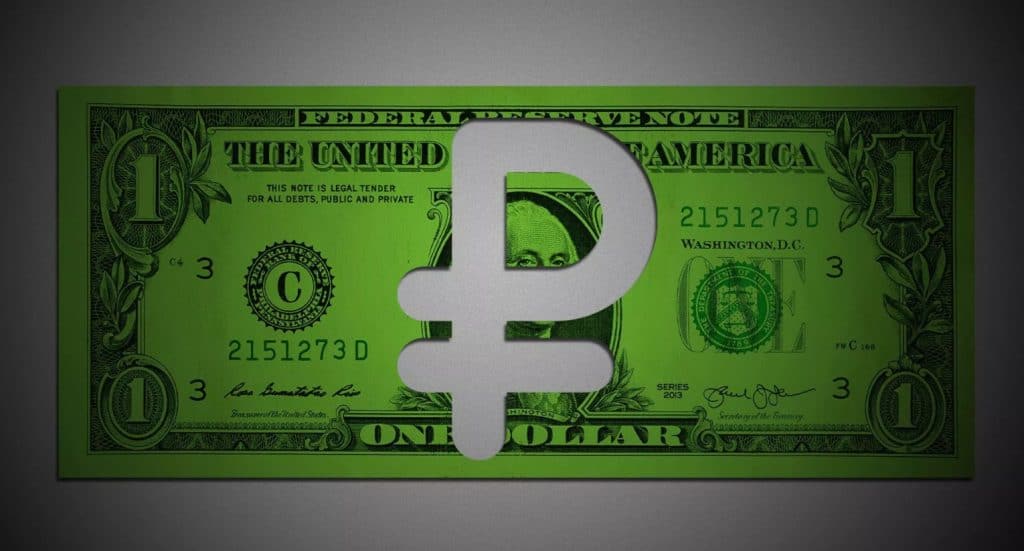
One of the next big questions looming over the economic war against Russia is what will happen to its sovereign bonds. The Russian government has borrowed about $49 billion in the form of dollar- and euro-denominated bonds, and owes a series of interest payments to bondholders in the coming months.
Why it matters: If Russia defaults on its debt, it will play out differently than sovereign defaults of the past — and investors are watching for signs that it could ripple out into a broader market dislocation, as Russia’s 1998 ruble debt default did.
- “The default risk is real,” George Catrambone, DWS Group’s head of Americas trading, tells Axios.
- And the market for Russian bonds is in uncharted territory, effectively frozen. There are few buyers, and some clearinghouses won’t execute trades, he says.
The latest: A decree signed by Russian President Vladimir Putin over the weekend said that Russia can pay foreign creditors — but only with rubles, which are rapidly depreciating, Bloomberg reports.
The big picture: Muting the systemic worry somewhat, Russia’s only a small part of emerging market (EM) indexes. In the U.S., its bonds have been held mainly by long-only EM mutual funds (as opposed to levered hedge funds), while Western banks appear to have minimal exposure to Russian assets on the whole.
- Still, the question of market impact remains unanswerable for now, sources tell Axios.
And adding to overall market jitters, other EM defaults could pile up.
- Belarus and Ukraine government bonds are trading like they’re going to default — and Russia’s economic contraction along with higher commodity costs could tip others into distress, says Mitu Gulati, a law professor at the University of Virginia who focuses on sovereign debt-restructuring.
State of play: Whether Russia defaults on its external bonds will depend both on the country’s willingness to pay principal and interest amounts as they come due (unlikely, considering the West froze a bunch of its money) — and its ability to transfer the payments (an open question, given the sanctions), says Lee Buchheit, a veteran sovereign debt-restructuring lawyer, now at the University of Edinburgh.
- A debt default is usually bad for the defaulting nation. They get a huge blemish on their credit score, and are essentially cut off from the global capital markets for a time while they work out a deal with their creditors.
- Yes, but: Russia’s already cut off from the markets — by virtue of sanctions imposed by the U.S. and its allies. And the state of open hostility (Putin described the sanctions as a declaration of war) will make a debt restructuring deal near impossible to achieve.
How it (usually) works: When a government defaults, it negotiates with its bondholders to consensually restructure the debt. The deal that ensues often involves those holders forgiving some of the debt in exchange for promises of balanced budgets and fiscal austerity, among other things.
- This can take years, and can be super fraught, but it’s a process the market is familiar with.
On the flip side: Were Russia to default on its external bonds, some holders might elect to sue and attempt to attach — or get a lien on — Russian assets abroad even if the sanctions were then in place, Buchheit says. They would be betting that if and when the assets became unfrozen from the sanctions, their judicial attachments would bite.
Where it stands: Some, like Jay Newman, alum of Elliott Management — and of Argentina’s restructuring — say the bonds are worth zero.
- But, but, but: At some point, vultures will probably pounce. Some distressed investors are quietly waiting for the right opportunity (read: bonds available at mere pennies on the dollar) and evaluating whether strategies like aggressively pursuing Russia’s assets could pay off, says Gulati.
What to watch: One of the biggest early tests of Russia’s intentions will come next week. Over $100 million in interest payments are due March 16 on itsforeign currency bonds.